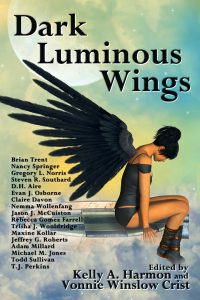It’s been awhile since I’ve conducted an author interview, but Jeffrey G. Roberts recently landed a WW II Spitfire on the airfield here at Poseidon’s Scribe Enterprises. He and I both have stories appearing in the upcoming anthology Dark Luminous Wings. So I asked him a few questions.
 Jeffrey’s Dad was a pilot in World War II, and that’s where Jeffrey got his love of aviation. He graduated from Northern Arizona University, in Flagstaff, Arizona, in 1974 with a Bachelor’s degree in writing and a Master’s degree in history. He’s lived in many places—Florida, New York, California, Ontario, Canada, and now Arizona. He started writing seriously around 1978. Since then, he’s written The Healer, plus seven novels of science fiction, fantasy, horror, as well as numerous short stories. Jeffrey says he’s attracted to the weird & unexplainable; he wrote his master’s thesis on the lost continent of Atlantis.
Jeffrey’s Dad was a pilot in World War II, and that’s where Jeffrey got his love of aviation. He graduated from Northern Arizona University, in Flagstaff, Arizona, in 1974 with a Bachelor’s degree in writing and a Master’s degree in history. He’s lived in many places—Florida, New York, California, Ontario, Canada, and now Arizona. He started writing seriously around 1978. Since then, he’s written The Healer, plus seven novels of science fiction, fantasy, horror, as well as numerous short stories. Jeffrey says he’s attracted to the weird & unexplainable; he wrote his master’s thesis on the lost continent of Atlantis.
Now, the interview:
Poseidon’s Scribe: How did you get started writing? What prompted you?
Jeffrey G. Roberts: I started writing in college, Northern Arizona University. I simply have a creative imagination. My Dad did too, as he wrote for radio just after WW II. I like to create worlds that do not exist – but might; characters that are not yet in existence – but could be; and situations that never happened – but someday could. A writer is like a god – creating, destroying, altering, then creating again. I often wondered, in my overactive imagination, if, when I go to sleep at night, if my characters keep looking at their watches, frozen in time, waiting for the morning, when their creator will breathe life into them once again—to move, to love—to be!
P.S.: On your website, you list some of your favorite authors as Ray Bradbury, Douglas Adams, Arthur C. Clarke, James Thurber, Thornton Wilder, and H.G. Wells. If you could pick just two or three of these, what do you like about their fiction and how did they influence you?
J.G.R.: I’ve always admired Ray Bradbury for his surrealism and child-like fantasies, such as Dandelion Wine and The Halloween Tree. He explores that twilight world between dreams and reality, which I love. Douglas Adams, in his Hitchhikers Guide to the Galaxy series, was a brilliant comedic wit, who I try to emulate in my work.
P.S.: When and why did you begin writing fiction?
J.G.R.: I dabbled in story writing in Junior college, but really began to explore my abilities when I attended Northern Arizona University, in Flagstaff, AZ, where I eventually received a degree in writing.

 P.S.: You’ve written some stories utilizing time travel, notably your novels The Healer and Cherries in Winter. What fascinates you about time travel?
P.S.: You’ve written some stories utilizing time travel, notably your novels The Healer and Cherries in Winter. What fascinates you about time travel?
J.G.R.: What might be, what could be; either in the distant future, or in an alternative future where everything has changed from what we know—like the American flag being red, white—and green; or interstellar travel as perfectly normal in 2017; or the geographical boundaries of nations are completely different than when we left on our journey of discovery—these are ideas and concepts which fascinate me, and whose depths I delight in plumbing.
P.S.: What are the easiest, and the most difficult, aspects of writing for you?
J.G.R.: For me, the easiest part of writing, ironically, is the writing process itself. The most difficult, undoubtedly, is the tortuous process of self promoting my novels and stories. It’s like blood-letting of the creative soul.
P.S.: Your story “One Day in the Hills of Milan” will appear in the upcoming anthology  Dark Luminous Wings. Please tell us about it.
Dark Luminous Wings. Please tell us about it.
J.G.R.: I’ve always been deeply involved in the love of aviation. My Dad was a decorated ace in WW II, flying Spitfires, as an American in the RAF. So I guess I got the flying bug from him; soloing in 1968. And I’d always been fascinated by the fact that history has never been able to conclusively prove 100%, that Leonardo da Vinci did not fly his man-powered glider. Some accounts say his assistant actually did, breaking both kneecaps upon landing. And I thought – what if?
P.S.: What inspired you to write “One Day in the Hills of Milan?”
J.G.R.: The genius of Da Vinci has always fascinated me. How could he have been centuries ahead of his time? Perhaps he had ‘help?’
P.S.: In what way is your fiction different from that of other authors?
J.G.R.: At the risk of sounding conceited, I never start a story or new novel, if I know the concept has already been done. If it has, I tweak it, I twist it, and I present in an entirely new light; i.e., I try to march to the beat of a different drummer, creatively speaking.
P.S.: You have a book coming out titled In the Shadow of the House of God. When will it launch and what is it about?
J.G.R.: It will be out in May of 2018. Hatred has run amuck in our civilization. Blood is being shed planet-wide, as mutual animosities, suspicions, and antagonisms between the 34,000 religions on Earth (believe it or not!) threaten to erupt into Armageddon. And this is where the Devil devises an insidious plan to take advantage of all this hate, once and for all! So he makes a wager with God: “I believe humanity is basically vulgar, vicious, and filled with wondrous hate. I’ll wager, if you pluck one representative of every religion on Earth, and put them into a titanic edifice of your own design, beyond space and time, then eventually this beautiful hatred will cause them to slaughter each other!” God thinks for a moment—and accepts the wager! But every wager has a condition, or price. The stakes here? Creation itself! But there is something the Devil does not know. And for 3 people: a Hindu from India, A Christian from San Diego, and a bitter agnostic from Vancouver, B.C., what plays out in this interdimensional arena will forge lasting friendships—as the Devil and God look down on this cosmic chess match, to observe what happens next. A new age of peace? Or hell on Earth?
P.S.: What is your current work in progress? Would you mind telling us a little about it?
J.G.R.: I am currently working on another novel, The Horror on the HMS Cottingly.
Poseidon’s Scribe: What advice can you offer aspiring writers?
Jeffrey G. Roberts: My advice for aspiring writers is: A – have patience; B – Develop a thick skin, able to take rejection (Something I have to work on daily!); and C – Persistence. Someone once said that to be a successful writer, an aspiring author should go out and buy all the books on the art of writing you can; study them all—them throw them in the garbage! Because if you follow their advice to the letter, do you know what your book will be—bloodless, with no soul, no color, no voice. Your voice! Your style! How many writers in the past broke many literary rules? Writers like Hemingway, Steinbeck, and Bradbury. But in so doing, they developed their own voice & style. Learn your craft well – then develop your own voice!
Thanks for winging your way here, Jeffrey! Though his plane has been fueled and is taking off, readers can find out more about him at his website, on Twitter, Facebook, Goodreads, and LinkedIn. His novel The Healer is available here, here, and here, and you can watch a trailer video here (or here on some browsers). His novel Cherries in Winter is available here, here, and here. You can watch its trailer video here.
Poseidon’s Scribe
